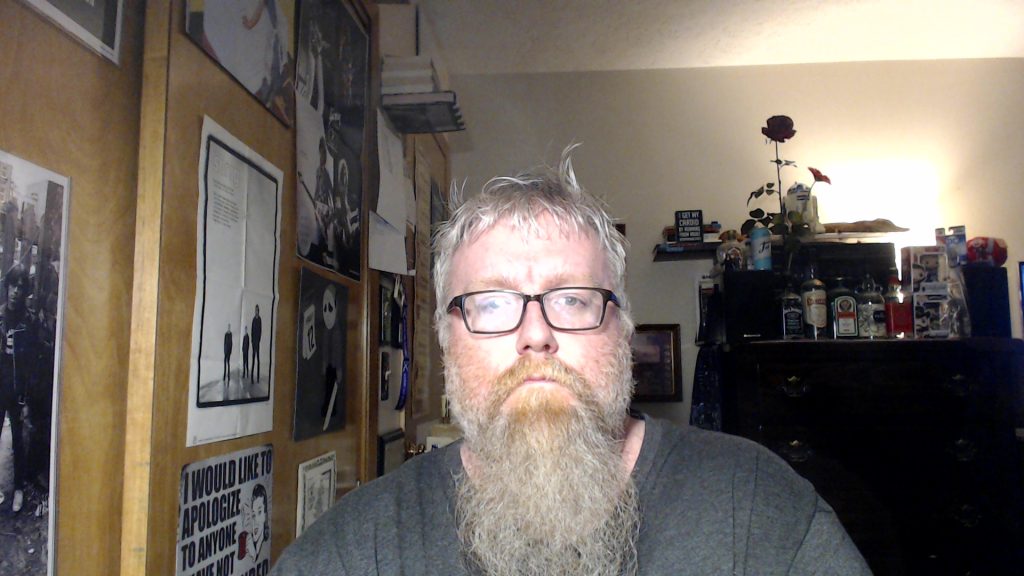Still Life with Dead Zone
1-
Blackbirds at Dusk
Bare tree outlined against a brushed-of-light sky. Blackbirds risen in flight. Cold,
shifting wind suggests a freezing rain, sleet changing to snow. In the valley, the cleared
field is collecting birds. Their gathering a strange collection of living matter among the
desiccated stumps of summer. Long rows of them, newly sprouted like nightmares.
Moon rise with
white comet tails;
ghost light on an
empty outdoor stage
After the flight of birds, silence. Nothing moving among the dead, leafless trees, sheared
to the stumps or broken into diseased humps, sprouting from the ground like the broken limbs of
dead soldiers planted as a warning for those who follows after. The muffled steps of what comes
after the night, their obscene bodies, their wings.
2-
Flyway
Pre-front clouds, a black fistula consuming a bent horizon. Birds in migratory flight
flee the stilted hills, the nesting grounds. Static electricity rubs the color from the sky. An open
wound left behind.
Flat sky, sun torn
fabrics, black
blood blisters. Birds.
Incongruous tarmac at the edge of wild jungle growth baked hard by relentless sun. Air
ground control station, elevated sniper/ guard towers overlooking the perimeter, concertina wire,
no man’s land. Toward nightfall, a mad minute, tracer rounds instead of exotic birds flights;
incoming instead of by-air transport.
3-
Roadside Marker
Early morning still life with grazing cows. Sun bursting off last finger of ground fog
drying the low, foraged grass. Budding trees just beyond wending wall of rock separating fields
from drainage ditches and black topped road. Clipped lily on white cross by bare black limbed,
skinned-of-bark tree. A scatter of car parts. Windshield glass.
Confluence of shadow
and fog, no light
leaking through.
White stone marker embedded roadside indicates eighty-one kilometers to nowhere.
Lifting ground fog and battlefield smoke envelop cratered highway littered with discarded gear:
worn boots, torn rucksacks, unfolded blankets, ruptured canteens, tattered tents. Along the road,
stunted trees, a long, thin barbed wire fence posted with warning signs, blackened fields of burnt
elephant grass. Still life with dead zone.
4-
Flooded Road
Legacy of storm; a spontaneous inland sea. Reflections of immersed objects in still
water: trees, tops of fence posts, vehicle roofs, antennae, tips as rigid as insects remains. Clear,
cloudless sky cleansed of light.
Temporary bridges
between two shores,
water in the middle
washing them away.
Fording the river in full combat gear. Foot soldiers holding their weapons diagonally
overhead, walking, waist high, then chest high, some totally submerged. Only the rifles, still
mostly dry, visible above the surging water.
5-
Fog and Woodsmoke
Evening haze with scent of cook stoves, fireplaces. Houses trimmed with decorative
lights off-season; an almost unearthly glowing in near-night darkness. Still life with cracked
blacktop and low hanging trees. The pulsing of the overhead wires almost audible. Nothing
moving but the smoke. The haze. The strange rings of the overhead street lights.
Dead air with black
smoke; impossible
to breathe.
Smoke from the burning thatched huts. The guts of cook fire spread on the hard packed
earth: embers, overturned black pot, utensils for stirring, nearby. Last, spent remnants of
location-marking flares amid the black, billowing smoke. A naked baby, sitting amid the
wreckage, screaming.
6-
Pavement Ends
Single lane of hard packed, graded rock between fenced fields. Thick, intensifying
ground fog covering the land, obscuring the caution sign, masking the way. Vision, at last light,
no more than a few feet forward. Soon, the dark.
Maps without borders,
unmarked trails
have no end.
Bent-to-the-earth signs say: Extreme Caution: Minefield Do Not Enter. A skull and
crossed bones penciled beneath the words. Fields extending on either side of the road into the
dark; the enclosing jungle trees beyond. The way on either side cratered from overhead
bombing or from something explosive underneath. Large pits with still water inside. Other
objects, as well. Soon, the dark.

